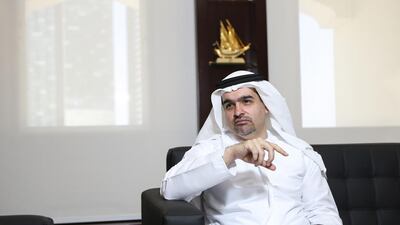Abdulla Al Awar is a man on a mission. He has a deadline to meet, and he is acutely aware of it.
Sheikh Mohammed bin Rashid, Vice President of the UAE and Ruler of Dubai, wants the emirate to be the hub of the global Islamic commercial and financial world by late 2016, and has made Mr Al Awar the man responsible for achieving that ambition.
The history of Dubai’s economic development falls into a pattern: visionary ambitions set by the Ruler are implemented by enthusiastic, talented executives drawn from the top tier of the Dubai business cadre.
They are under pressure to get the job done, but there are no visible strains of the pressure on Mr Al Awar, a former chief executive of the Dubai International Financial Centre. As CEO of the Dubai Islamic Economy Development Centre, he speaks with a quiet but firm confidence that he will get the job done.
“We are on track to meet the target. The important thing is not to trade impact events for long-term quality,” he says.
The aim is to make Dubai the centre of a global business market in Islamic products and services, from banking to food production, from tourism to education, and from cosmetics to the digital economy. The global value of that business is estimated at around US$8 trillion.
Speaking just before the opening of the World Islamic Economic Forum, in Dubai for the first time in its 10 year history, Mr Al Awar was satisfied with the progress made over the past year, but aware of the many challenges still remaining. “We are forging ahead,” he says.
The goals have been set out as seven "pillars" that need to be built to support Dubai as the capital of the global Islamic economy: Islamic finance; the halal industry; tourism; digital infrastructure; arts; knowledge; and standardisation.
A more granular approach breaks down those seven pillars into more than 40 individual initiatives which must be accomplished, but Mr Al Awar is aware of the dangers of micromanagement. “I don’t see this just as a box-ticking exercise. This is a long-term initiative and we do not simply stop when we have achieved one launch. It is a continuing, evolving exercise,” he says.
Nonetheless, he can highlight areas where particular progress has been made over the past year. Of the seven pillars, two are particularly important: Islamic finance and halal consumer products.
“There has been exceptional growth in Islamic financial markets. When the Islamic capital initiative was first launched in early 2013, there were US$9 billion worth of sukuk listed in Dubai, now there is $21bn. The pace of growth in this market has been faster than anywhere else in the world,” he says.
“The Islamic financial universe has gained the trust of Muslims and non-Muslims alike, and we’ve seen some remarkable developments, like the recent $1bn Hong Kong sukuk listed in Dubai. That really is a vote of confidence by one of the great financial centres of the world.”
In halal food, the great aim is to make Dubai a recognised standard-setter for food and consumer goods across the world. The Emirates Authority for Standards and Metrology recently launched the UAE halal stamp of approval, to provide criteria for companies making halal products.
“As the official halal stamp of the UAE, the aim is to make it a national trademark of halal excellence and a global brand for Muslims,” says Mr Al Awar.
Halal food distribution has also been a focus of attention, with the opening of halal-certified zones at Jebel Ali, the UAE’s biggest port. “This is paving the way for cross-border trade in halal products, creating a one-stop shop for halal goods and a logistics corridor that runs from Jebel Ali to Al Maktoum airport and out to the world,” says Mr Al Awar.
Standardisation is the key to the ambitious plan. If other Islamic countries can be persuaded that Dubai’s standards and practices are to be regarded as the international standard, the emirate will have gone a long way to reaching its goal.
“This is crucial. Dubai’s role so far has been to facilitate a dialogue and we’ve had a series of round-table discussions with all the main standards bodies of the Islamic world,” he says.
But he warns that with a global population of about 1.6 billion Muslims spread across many countries, reaching a universal standard might be impractical.
Dubai is working away within the global Islamic community to achieve this, and is also engaged in top-level talks with big Islamic countries, such as Malaysia and Indonesia.
The other area he highlights is in education.
“We’ve opened up the centre for Islamic banking and financial studies at Sheikh Hamdan bin Mohammed University, and we’re currently in the process of deciding the Islamic economy awards. The number of submissions exceeded last year, and were of a very high standard,” he says.
There was also progress in waqf, the Islamic use of endowment funds for humanitarian aid, which Mr Al Awar says “went global” this year; and the Salma initiative, which helped to distribute emergency relief, first in Gaza last Ramadan, but with the aim of becoming a permanent global institution.
“We have achieved a lot, but the strategy is for the seven pillars to be constructed in parallel. It is all part of a fully fledged and integrated strategy,” he adds. And the clock is ticking.
fkane@thenational.ae
Follow The National's Business section on Twitter

